Global Business Report: EEC, MNCs, Internationalization, and Tesco
VerifiedAdded on 2023/01/10
|17
|5090
|31
Report
AI Summary
This report delves into the realm of global business, exploring the European Economic Community (EEC) and its impact, alongside an examination of Multinational Corporations (MNCs) and their motivations for internationalization. The report provides an in-depth analysis of the EEC, outlining its pros and cons, and also discusses the reasons behind MNCs' internationalization, including market seeking, profitability, and access to resources. The study further investigates the challenges associated with internationalization, such as human capital, cultural differences, customer experience, and risk. The report then focuses on Tesco, a British multinational retailer, analyzing its domestic market and proposing strategies for international expansion, including environmental analysis, entry modes, and the leadership qualities needed to support market entry. The analysis incorporates an individual reflective essay, providing a comprehensive overview of the complexities and opportunities within the global business landscape.
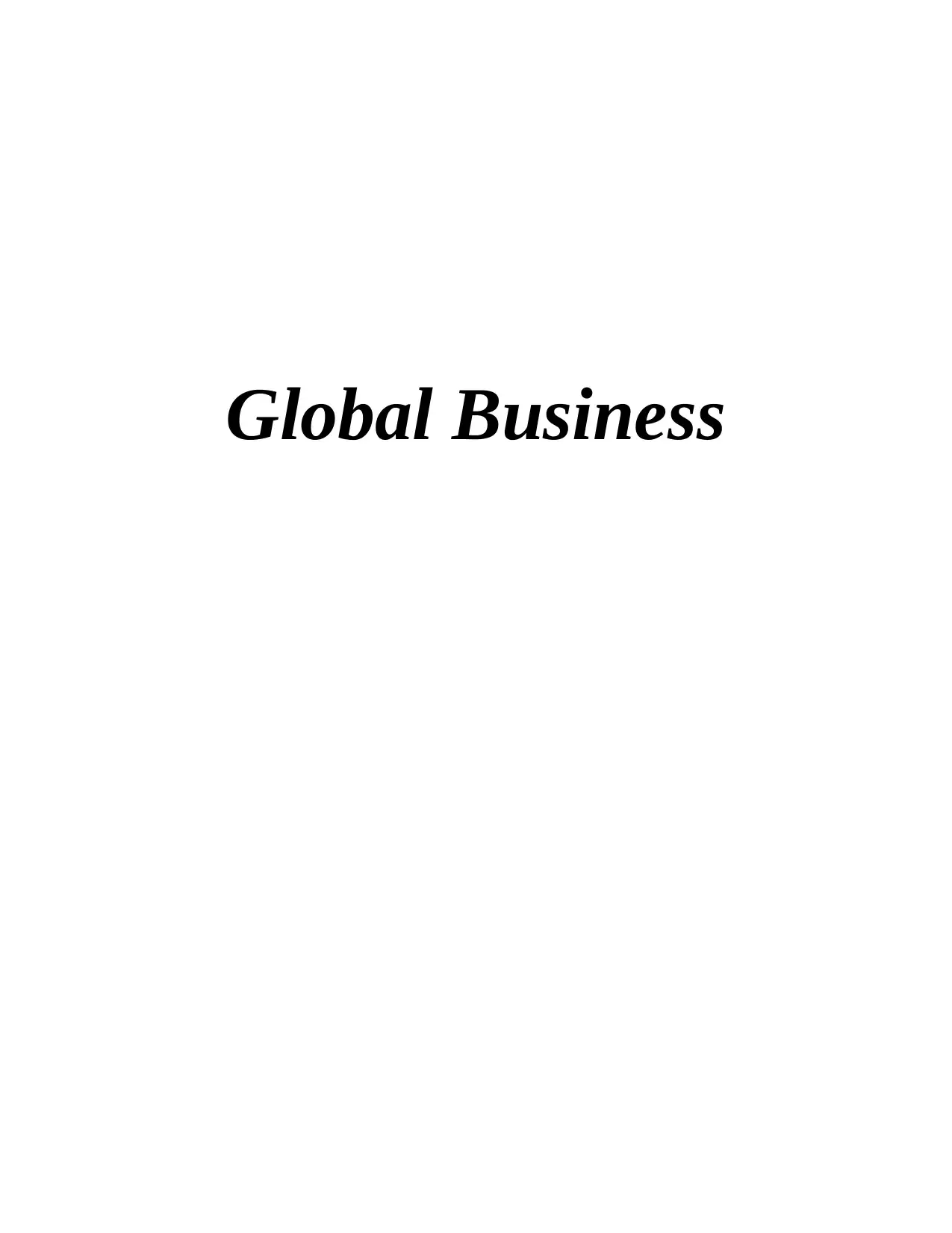
Global Business
Paraphrase This Document
Need a fresh take? Get an instant paraphrase of this document with our AI Paraphraser
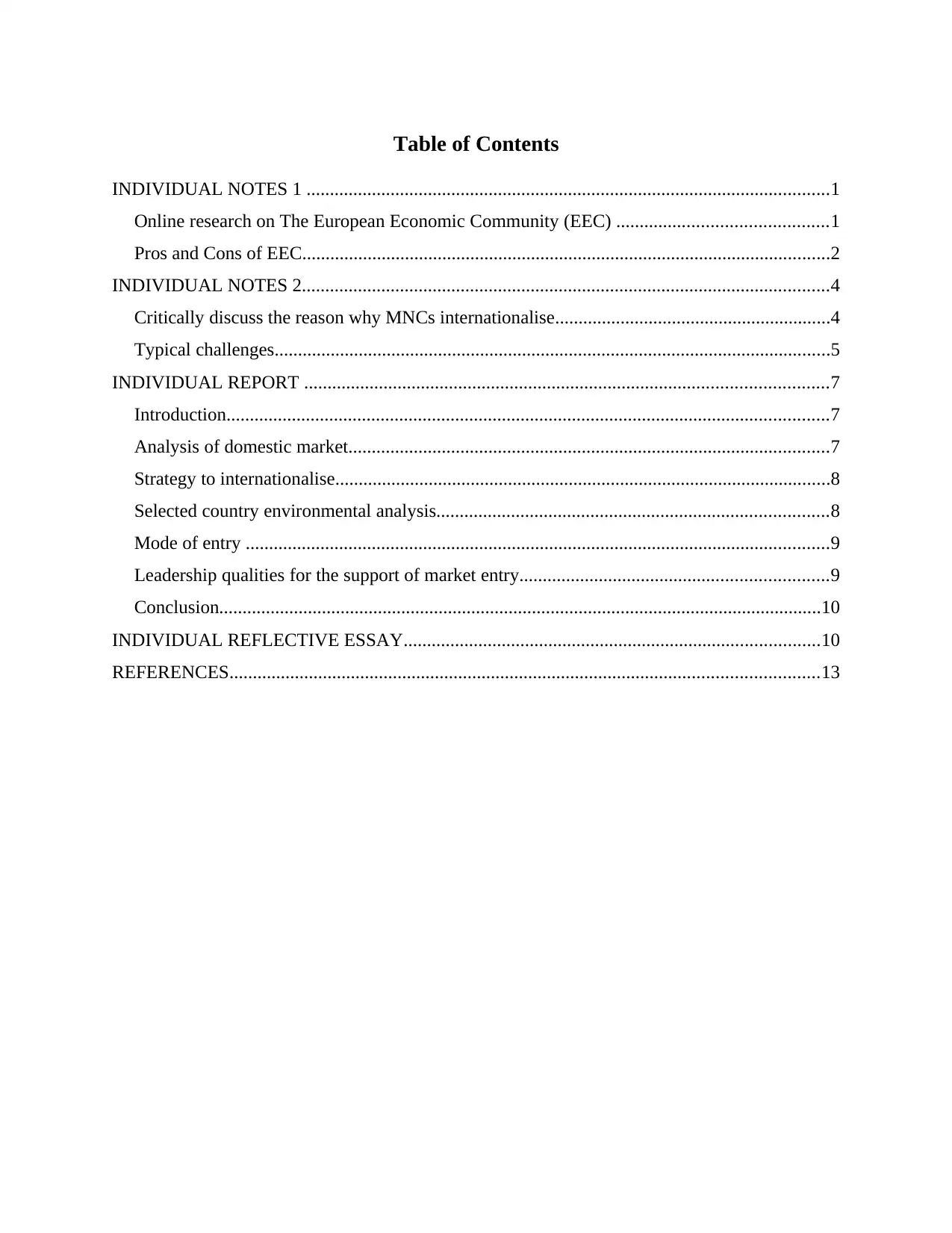
Table of Contents
INDIVIDUAL NOTES 1 ................................................................................................................1
Online research on The European Economic Community (EEC) .............................................1
Pros and Cons of EEC.................................................................................................................2
INDIVIDUAL NOTES 2.................................................................................................................4
Critically discuss the reason why MNCs internationalise...........................................................4
Typical challenges.......................................................................................................................5
INDIVIDUAL REPORT ................................................................................................................7
Introduction.................................................................................................................................7
Analysis of domestic market.......................................................................................................7
Strategy to internationalise..........................................................................................................8
Selected country environmental analysis....................................................................................8
Mode of entry .............................................................................................................................9
Leadership qualities for the support of market entry..................................................................9
Conclusion.................................................................................................................................10
INDIVIDUAL REFLECTIVE ESSAY.........................................................................................10
REFERENCES..............................................................................................................................13
INDIVIDUAL NOTES 1 ................................................................................................................1
Online research on The European Economic Community (EEC) .............................................1
Pros and Cons of EEC.................................................................................................................2
INDIVIDUAL NOTES 2.................................................................................................................4
Critically discuss the reason why MNCs internationalise...........................................................4
Typical challenges.......................................................................................................................5
INDIVIDUAL REPORT ................................................................................................................7
Introduction.................................................................................................................................7
Analysis of domestic market.......................................................................................................7
Strategy to internationalise..........................................................................................................8
Selected country environmental analysis....................................................................................8
Mode of entry .............................................................................................................................9
Leadership qualities for the support of market entry..................................................................9
Conclusion.................................................................................................................................10
INDIVIDUAL REFLECTIVE ESSAY.........................................................................................10
REFERENCES..............................................................................................................................13
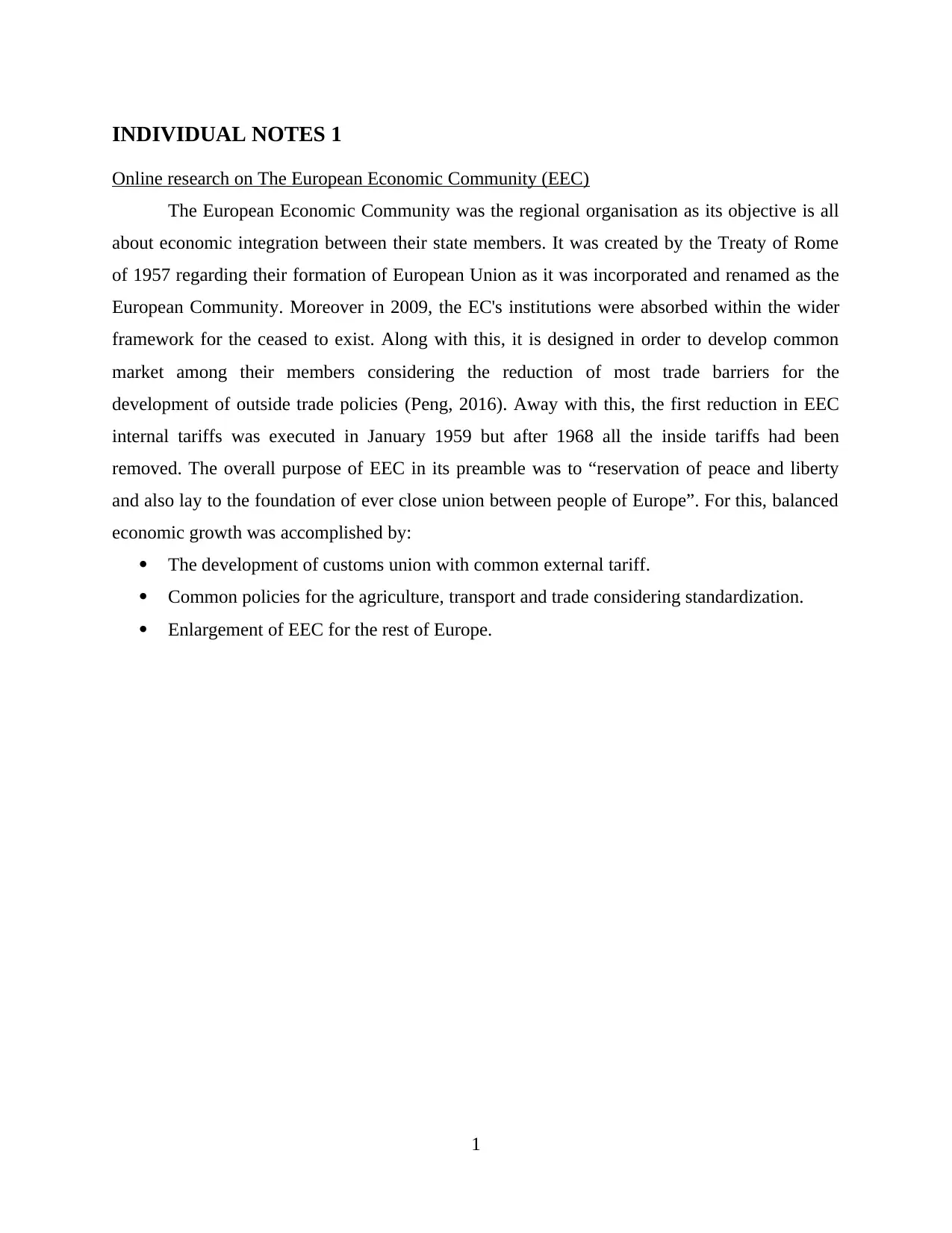
INDIVIDUAL NOTES 1
Online research on The European Economic Community (EEC)
The European Economic Community was the regional organisation as its objective is all
about economic integration between their state members. It was created by the Treaty of Rome
of 1957 regarding their formation of European Union as it was incorporated and renamed as the
European Community. Moreover in 2009, the EC's institutions were absorbed within the wider
framework for the ceased to exist. Along with this, it is designed in order to develop common
market among their members considering the reduction of most trade barriers for the
development of outside trade policies (Peng, 2016). Away with this, the first reduction in EEC
internal tariffs was executed in January 1959 but after 1968 all the inside tariffs had been
removed. The overall purpose of EEC in its preamble was to “reservation of peace and liberty
and also lay to the foundation of ever close union between people of Europe”. For this, balanced
economic growth was accomplished by:
The development of customs union with common external tariff.
Common policies for the agriculture, transport and trade considering standardization.
Enlargement of EEC for the rest of Europe.
1
Online research on The European Economic Community (EEC)
The European Economic Community was the regional organisation as its objective is all
about economic integration between their state members. It was created by the Treaty of Rome
of 1957 regarding their formation of European Union as it was incorporated and renamed as the
European Community. Moreover in 2009, the EC's institutions were absorbed within the wider
framework for the ceased to exist. Along with this, it is designed in order to develop common
market among their members considering the reduction of most trade barriers for the
development of outside trade policies (Peng, 2016). Away with this, the first reduction in EEC
internal tariffs was executed in January 1959 but after 1968 all the inside tariffs had been
removed. The overall purpose of EEC in its preamble was to “reservation of peace and liberty
and also lay to the foundation of ever close union between people of Europe”. For this, balanced
economic growth was accomplished by:
The development of customs union with common external tariff.
Common policies for the agriculture, transport and trade considering standardization.
Enlargement of EEC for the rest of Europe.
1
⊘ This is a preview!⊘
Do you want full access?
Subscribe today to unlock all pages.

Trusted by 1+ million students worldwide
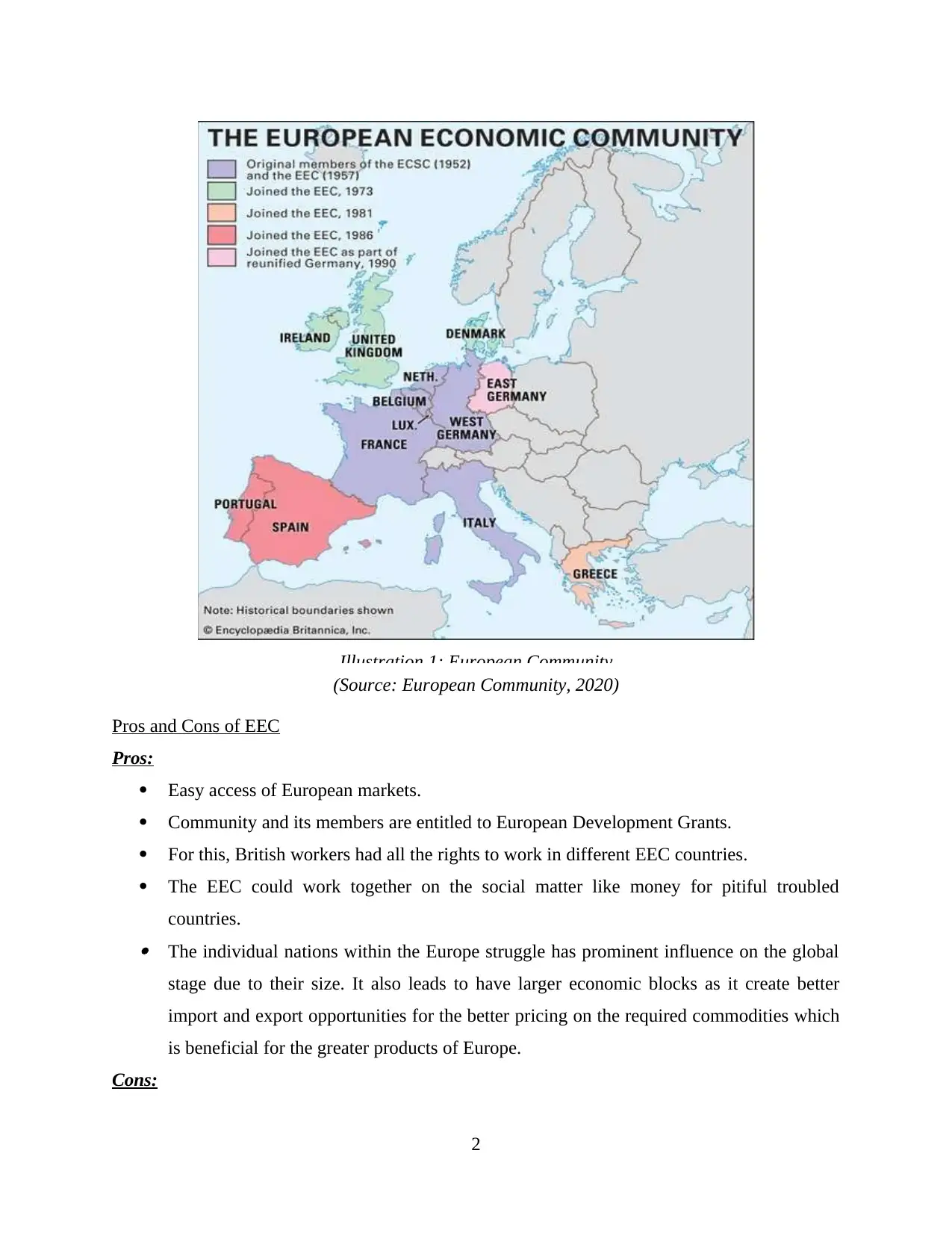
(Source: European Community, 2020)
Pros and Cons of EEC
Pros:
Easy access of European markets.
Community and its members are entitled to European Development Grants.
For this, British workers had all the rights to work in different EEC countries.
The EEC could work together on the social matter like money for pitiful troubled
countries. The individual nations within the Europe struggle has prominent influence on the global
stage due to their size. It also leads to have larger economic blocks as it create better
import and export opportunities for the better pricing on the required commodities which
is beneficial for the greater products of Europe.
Cons:
2
Illustration 1: European Community
Pros and Cons of EEC
Pros:
Easy access of European markets.
Community and its members are entitled to European Development Grants.
For this, British workers had all the rights to work in different EEC countries.
The EEC could work together on the social matter like money for pitiful troubled
countries. The individual nations within the Europe struggle has prominent influence on the global
stage due to their size. It also leads to have larger economic blocks as it create better
import and export opportunities for the better pricing on the required commodities which
is beneficial for the greater products of Europe.
Cons:
2
Illustration 1: European Community
Paraphrase This Document
Need a fresh take? Get an instant paraphrase of this document with our AI Paraphraser
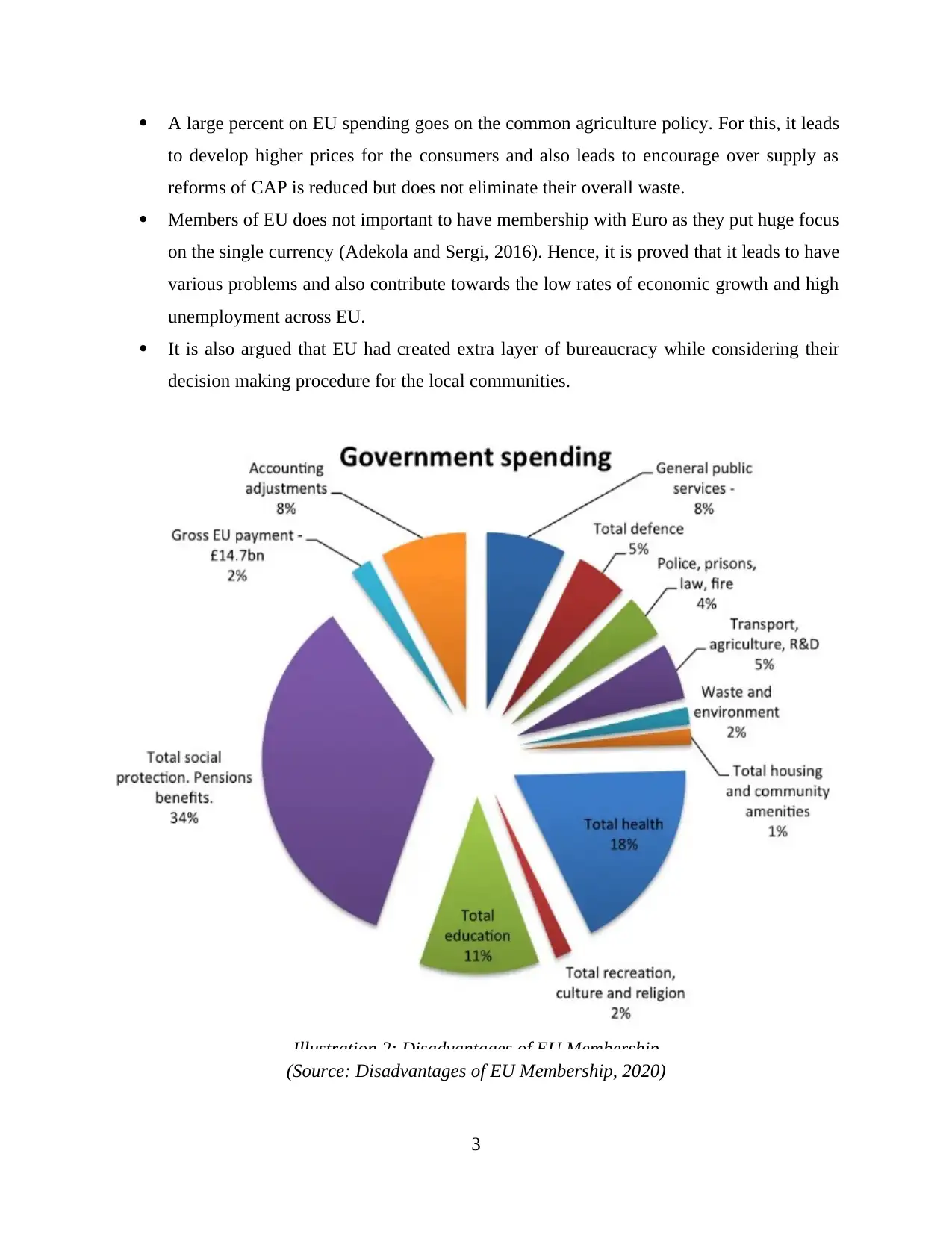
A large percent on EU spending goes on the common agriculture policy. For this, it leads
to develop higher prices for the consumers and also leads to encourage over supply as
reforms of CAP is reduced but does not eliminate their overall waste.
Members of EU does not important to have membership with Euro as they put huge focus
on the single currency (Adekola and Sergi, 2016). Hence, it is proved that it leads to have
various problems and also contribute towards the low rates of economic growth and high
unemployment across EU.
It is also argued that EU had created extra layer of bureaucracy while considering their
decision making procedure for the local communities.
(Source: Disadvantages of EU Membership, 2020)
3
Illustration 2: Disadvantages of EU Membership
to develop higher prices for the consumers and also leads to encourage over supply as
reforms of CAP is reduced but does not eliminate their overall waste.
Members of EU does not important to have membership with Euro as they put huge focus
on the single currency (Adekola and Sergi, 2016). Hence, it is proved that it leads to have
various problems and also contribute towards the low rates of economic growth and high
unemployment across EU.
It is also argued that EU had created extra layer of bureaucracy while considering their
decision making procedure for the local communities.
(Source: Disadvantages of EU Membership, 2020)
3
Illustration 2: Disadvantages of EU Membership
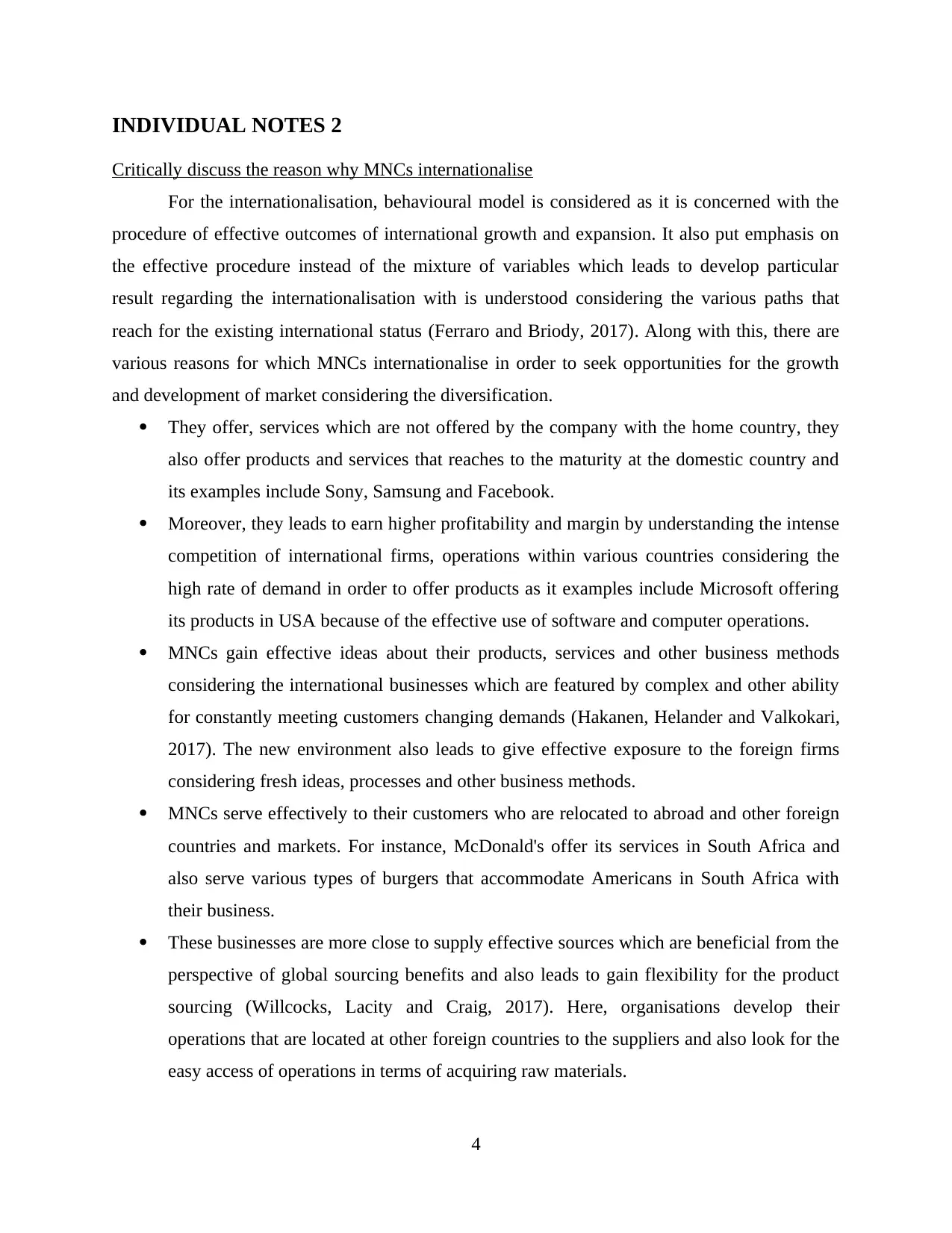
INDIVIDUAL NOTES 2
Critically discuss the reason why MNCs internationalise
For the internationalisation, behavioural model is considered as it is concerned with the
procedure of effective outcomes of international growth and expansion. It also put emphasis on
the effective procedure instead of the mixture of variables which leads to develop particular
result regarding the internationalisation with is understood considering the various paths that
reach for the existing international status (Ferraro and Briody, 2017). Along with this, there are
various reasons for which MNCs internationalise in order to seek opportunities for the growth
and development of market considering the diversification.
They offer, services which are not offered by the company with the home country, they
also offer products and services that reaches to the maturity at the domestic country and
its examples include Sony, Samsung and Facebook.
Moreover, they leads to earn higher profitability and margin by understanding the intense
competition of international firms, operations within various countries considering the
high rate of demand in order to offer products as it examples include Microsoft offering
its products in USA because of the effective use of software and computer operations.
MNCs gain effective ideas about their products, services and other business methods
considering the international businesses which are featured by complex and other ability
for constantly meeting customers changing demands (Hakanen, Helander and Valkokari,
2017). The new environment also leads to give effective exposure to the foreign firms
considering fresh ideas, processes and other business methods.
MNCs serve effectively to their customers who are relocated to abroad and other foreign
countries and markets. For instance, McDonald's offer its services in South Africa and
also serve various types of burgers that accommodate Americans in South Africa with
their business.
These businesses are more close to supply effective sources which are beneficial from the
perspective of global sourcing benefits and also leads to gain flexibility for the product
sourcing (Willcocks, Lacity and Craig, 2017). Here, organisations develop their
operations that are located at other foreign countries to the suppliers and also look for the
easy access of operations in terms of acquiring raw materials.
4
Critically discuss the reason why MNCs internationalise
For the internationalisation, behavioural model is considered as it is concerned with the
procedure of effective outcomes of international growth and expansion. It also put emphasis on
the effective procedure instead of the mixture of variables which leads to develop particular
result regarding the internationalisation with is understood considering the various paths that
reach for the existing international status (Ferraro and Briody, 2017). Along with this, there are
various reasons for which MNCs internationalise in order to seek opportunities for the growth
and development of market considering the diversification.
They offer, services which are not offered by the company with the home country, they
also offer products and services that reaches to the maturity at the domestic country and
its examples include Sony, Samsung and Facebook.
Moreover, they leads to earn higher profitability and margin by understanding the intense
competition of international firms, operations within various countries considering the
high rate of demand in order to offer products as it examples include Microsoft offering
its products in USA because of the effective use of software and computer operations.
MNCs gain effective ideas about their products, services and other business methods
considering the international businesses which are featured by complex and other ability
for constantly meeting customers changing demands (Hakanen, Helander and Valkokari,
2017). The new environment also leads to give effective exposure to the foreign firms
considering fresh ideas, processes and other business methods.
MNCs serve effectively to their customers who are relocated to abroad and other foreign
countries and markets. For instance, McDonald's offer its services in South Africa and
also serve various types of burgers that accommodate Americans in South Africa with
their business.
These businesses are more close to supply effective sources which are beneficial from the
perspective of global sourcing benefits and also leads to gain flexibility for the product
sourcing (Willcocks, Lacity and Craig, 2017). Here, organisations develop their
operations that are located at other foreign countries to the suppliers and also look for the
easy access of operations in terms of acquiring raw materials.
4
⊘ This is a preview!⊘
Do you want full access?
Subscribe today to unlock all pages.

Trusted by 1+ million students worldwide
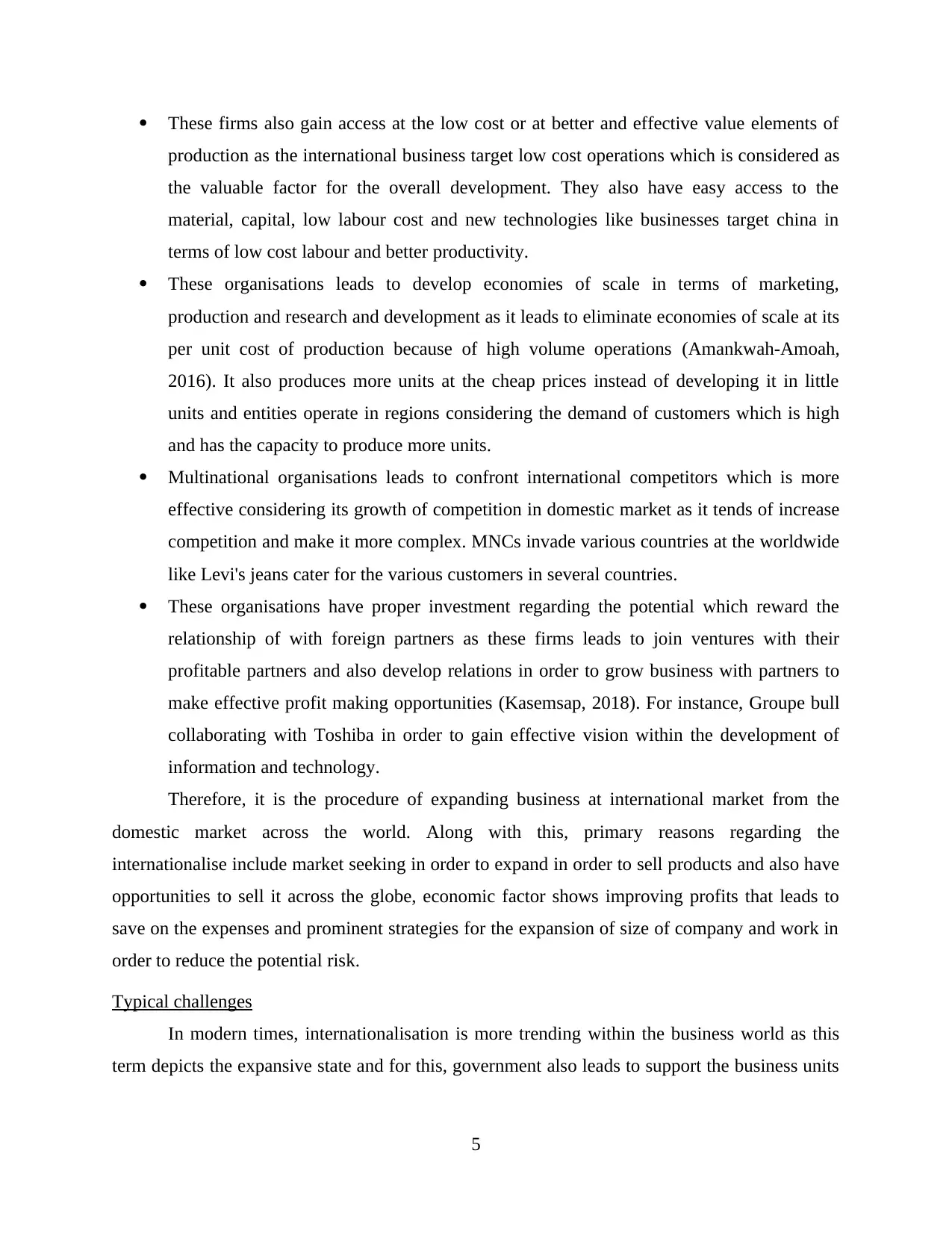
These firms also gain access at the low cost or at better and effective value elements of
production as the international business target low cost operations which is considered as
the valuable factor for the overall development. They also have easy access to the
material, capital, low labour cost and new technologies like businesses target china in
terms of low cost labour and better productivity.
These organisations leads to develop economies of scale in terms of marketing,
production and research and development as it leads to eliminate economies of scale at its
per unit cost of production because of high volume operations (Amankwah-Amoah,
2016). It also produces more units at the cheap prices instead of developing it in little
units and entities operate in regions considering the demand of customers which is high
and has the capacity to produce more units.
Multinational organisations leads to confront international competitors which is more
effective considering its growth of competition in domestic market as it tends of increase
competition and make it more complex. MNCs invade various countries at the worldwide
like Levi's jeans cater for the various customers in several countries.
These organisations have proper investment regarding the potential which reward the
relationship of with foreign partners as these firms leads to join ventures with their
profitable partners and also develop relations in order to grow business with partners to
make effective profit making opportunities (Kasemsap, 2018). For instance, Groupe bull
collaborating with Toshiba in order to gain effective vision within the development of
information and technology.
Therefore, it is the procedure of expanding business at international market from the
domestic market across the world. Along with this, primary reasons regarding the
internationalise include market seeking in order to expand in order to sell products and also have
opportunities to sell it across the globe, economic factor shows improving profits that leads to
save on the expenses and prominent strategies for the expansion of size of company and work in
order to reduce the potential risk.
Typical challenges
In modern times, internationalisation is more trending within the business world as this
term depicts the expansive state and for this, government also leads to support the business units
5
production as the international business target low cost operations which is considered as
the valuable factor for the overall development. They also have easy access to the
material, capital, low labour cost and new technologies like businesses target china in
terms of low cost labour and better productivity.
These organisations leads to develop economies of scale in terms of marketing,
production and research and development as it leads to eliminate economies of scale at its
per unit cost of production because of high volume operations (Amankwah-Amoah,
2016). It also produces more units at the cheap prices instead of developing it in little
units and entities operate in regions considering the demand of customers which is high
and has the capacity to produce more units.
Multinational organisations leads to confront international competitors which is more
effective considering its growth of competition in domestic market as it tends of increase
competition and make it more complex. MNCs invade various countries at the worldwide
like Levi's jeans cater for the various customers in several countries.
These organisations have proper investment regarding the potential which reward the
relationship of with foreign partners as these firms leads to join ventures with their
profitable partners and also develop relations in order to grow business with partners to
make effective profit making opportunities (Kasemsap, 2018). For instance, Groupe bull
collaborating with Toshiba in order to gain effective vision within the development of
information and technology.
Therefore, it is the procedure of expanding business at international market from the
domestic market across the world. Along with this, primary reasons regarding the
internationalise include market seeking in order to expand in order to sell products and also have
opportunities to sell it across the globe, economic factor shows improving profits that leads to
save on the expenses and prominent strategies for the expansion of size of company and work in
order to reduce the potential risk.
Typical challenges
In modern times, internationalisation is more trending within the business world as this
term depicts the expansive state and for this, government also leads to support the business units
5
Paraphrase This Document
Need a fresh take? Get an instant paraphrase of this document with our AI Paraphraser
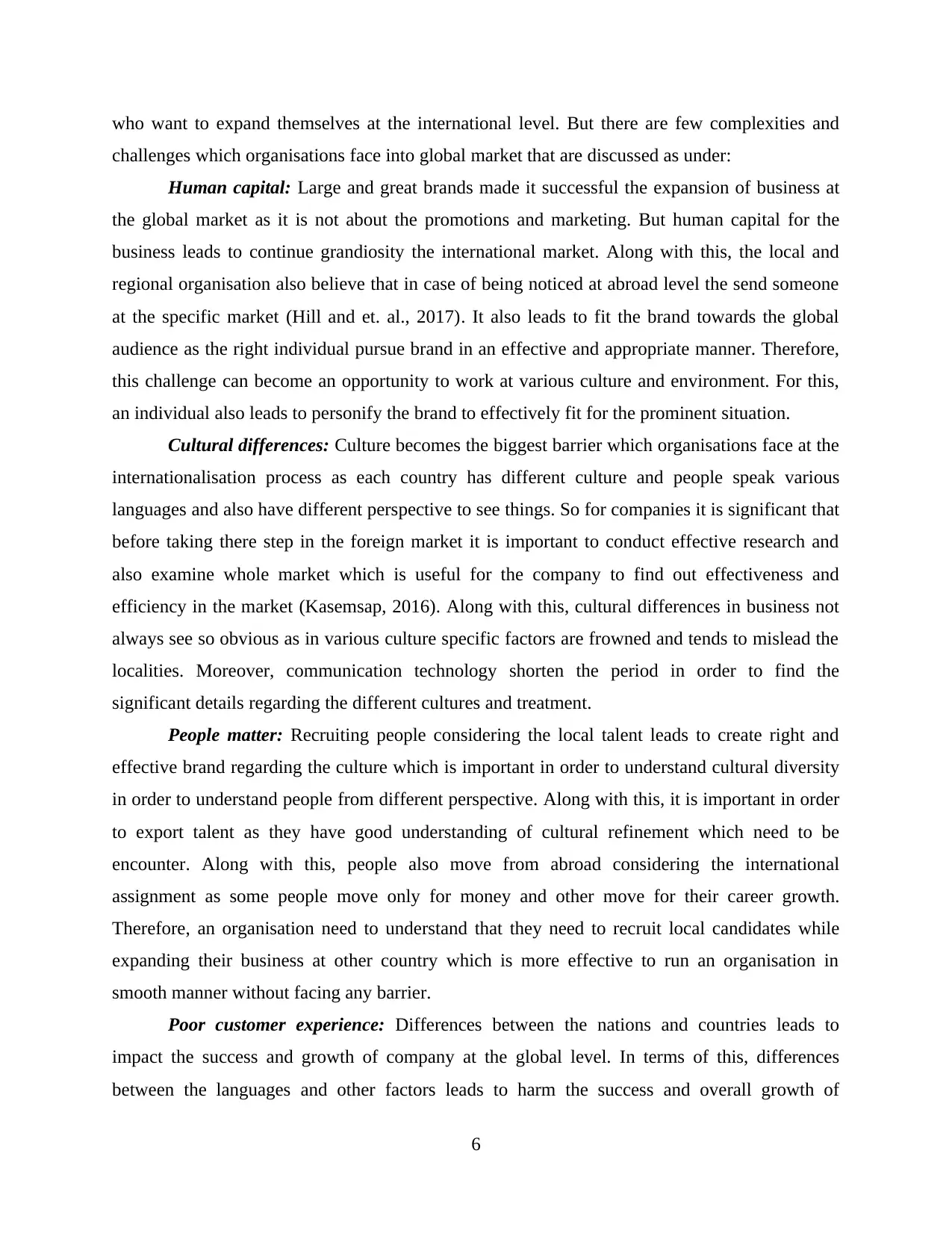
who want to expand themselves at the international level. But there are few complexities and
challenges which organisations face into global market that are discussed as under:
Human capital: Large and great brands made it successful the expansion of business at
the global market as it is not about the promotions and marketing. But human capital for the
business leads to continue grandiosity the international market. Along with this, the local and
regional organisation also believe that in case of being noticed at abroad level the send someone
at the specific market (Hill and et. al., 2017). It also leads to fit the brand towards the global
audience as the right individual pursue brand in an effective and appropriate manner. Therefore,
this challenge can become an opportunity to work at various culture and environment. For this,
an individual also leads to personify the brand to effectively fit for the prominent situation.
Cultural differences: Culture becomes the biggest barrier which organisations face at the
internationalisation process as each country has different culture and people speak various
languages and also have different perspective to see things. So for companies it is significant that
before taking there step in the foreign market it is important to conduct effective research and
also examine whole market which is useful for the company to find out effectiveness and
efficiency in the market (Kasemsap, 2016). Along with this, cultural differences in business not
always see so obvious as in various culture specific factors are frowned and tends to mislead the
localities. Moreover, communication technology shorten the period in order to find the
significant details regarding the different cultures and treatment.
People matter: Recruiting people considering the local talent leads to create right and
effective brand regarding the culture which is important in order to understand cultural diversity
in order to understand people from different perspective. Along with this, it is important in order
to export talent as they have good understanding of cultural refinement which need to be
encounter. Along with this, people also move from abroad considering the international
assignment as some people move only for money and other move for their career growth.
Therefore, an organisation need to understand that they need to recruit local candidates while
expanding their business at other country which is more effective to run an organisation in
smooth manner without facing any barrier.
Poor customer experience: Differences between the nations and countries leads to
impact the success and growth of company at the global level. In terms of this, differences
between the languages and other factors leads to harm the success and overall growth of
6
challenges which organisations face into global market that are discussed as under:
Human capital: Large and great brands made it successful the expansion of business at
the global market as it is not about the promotions and marketing. But human capital for the
business leads to continue grandiosity the international market. Along with this, the local and
regional organisation also believe that in case of being noticed at abroad level the send someone
at the specific market (Hill and et. al., 2017). It also leads to fit the brand towards the global
audience as the right individual pursue brand in an effective and appropriate manner. Therefore,
this challenge can become an opportunity to work at various culture and environment. For this,
an individual also leads to personify the brand to effectively fit for the prominent situation.
Cultural differences: Culture becomes the biggest barrier which organisations face at the
internationalisation process as each country has different culture and people speak various
languages and also have different perspective to see things. So for companies it is significant that
before taking there step in the foreign market it is important to conduct effective research and
also examine whole market which is useful for the company to find out effectiveness and
efficiency in the market (Kasemsap, 2016). Along with this, cultural differences in business not
always see so obvious as in various culture specific factors are frowned and tends to mislead the
localities. Moreover, communication technology shorten the period in order to find the
significant details regarding the different cultures and treatment.
People matter: Recruiting people considering the local talent leads to create right and
effective brand regarding the culture which is important in order to understand cultural diversity
in order to understand people from different perspective. Along with this, it is important in order
to export talent as they have good understanding of cultural refinement which need to be
encounter. Along with this, people also move from abroad considering the international
assignment as some people move only for money and other move for their career growth.
Therefore, an organisation need to understand that they need to recruit local candidates while
expanding their business at other country which is more effective to run an organisation in
smooth manner without facing any barrier.
Poor customer experience: Differences between the nations and countries leads to
impact the success and growth of company at the global level. In terms of this, differences
between the languages and other factors leads to harm the success and overall growth of
6
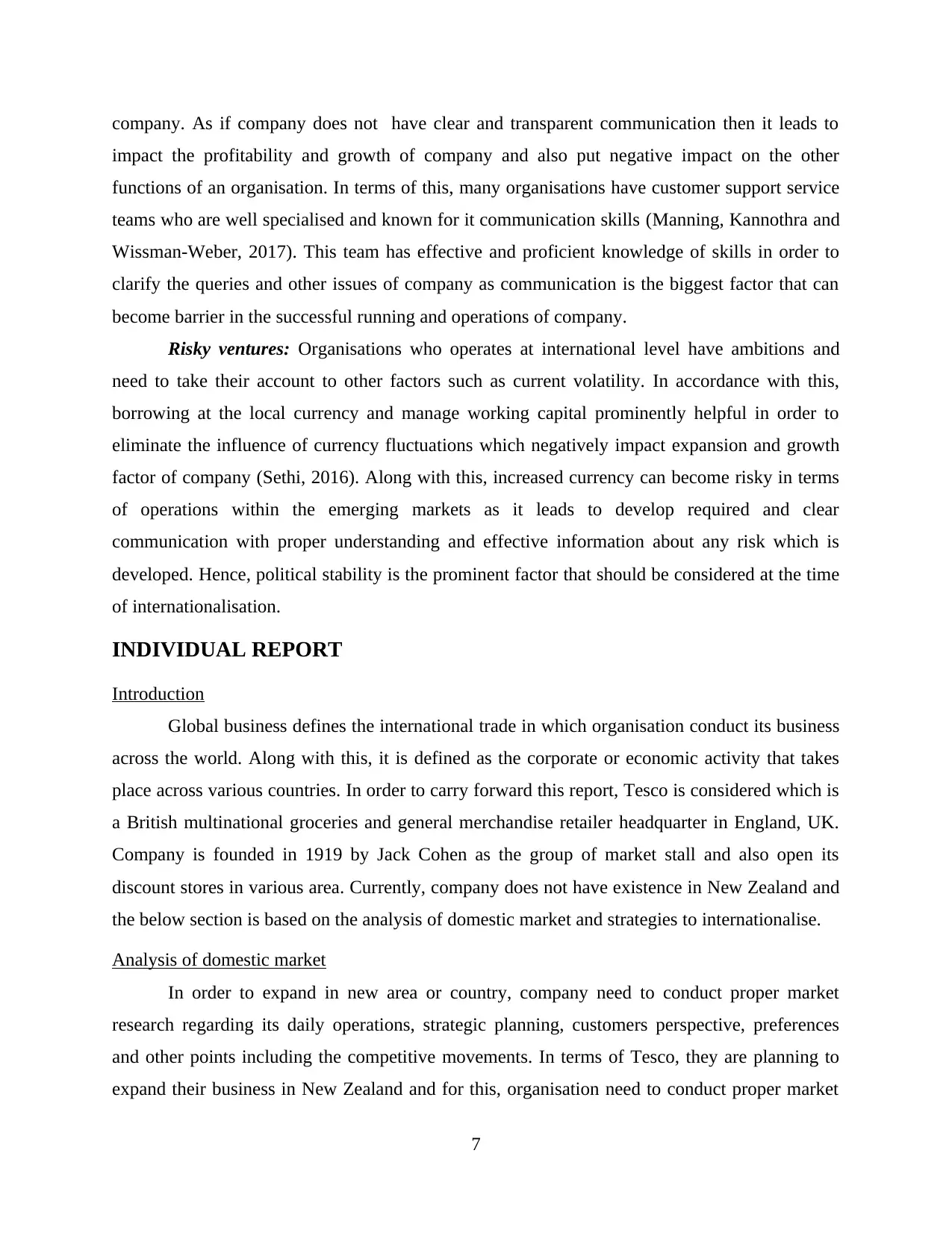
company. As if company does not have clear and transparent communication then it leads to
impact the profitability and growth of company and also put negative impact on the other
functions of an organisation. In terms of this, many organisations have customer support service
teams who are well specialised and known for it communication skills (Manning, Kannothra and
Wissman‐Weber, 2017). This team has effective and proficient knowledge of skills in order to
clarify the queries and other issues of company as communication is the biggest factor that can
become barrier in the successful running and operations of company.
Risky ventures: Organisations who operates at international level have ambitions and
need to take their account to other factors such as current volatility. In accordance with this,
borrowing at the local currency and manage working capital prominently helpful in order to
eliminate the influence of currency fluctuations which negatively impact expansion and growth
factor of company (Sethi, 2016). Along with this, increased currency can become risky in terms
of operations within the emerging markets as it leads to develop required and clear
communication with proper understanding and effective information about any risk which is
developed. Hence, political stability is the prominent factor that should be considered at the time
of internationalisation.
INDIVIDUAL REPORT
Introduction
Global business defines the international trade in which organisation conduct its business
across the world. Along with this, it is defined as the corporate or economic activity that takes
place across various countries. In order to carry forward this report, Tesco is considered which is
a British multinational groceries and general merchandise retailer headquarter in England, UK.
Company is founded in 1919 by Jack Cohen as the group of market stall and also open its
discount stores in various area. Currently, company does not have existence in New Zealand and
the below section is based on the analysis of domestic market and strategies to internationalise.
Analysis of domestic market
In order to expand in new area or country, company need to conduct proper market
research regarding its daily operations, strategic planning, customers perspective, preferences
and other points including the competitive movements. In terms of Tesco, they are planning to
expand their business in New Zealand and for this, organisation need to conduct proper market
7
impact the profitability and growth of company and also put negative impact on the other
functions of an organisation. In terms of this, many organisations have customer support service
teams who are well specialised and known for it communication skills (Manning, Kannothra and
Wissman‐Weber, 2017). This team has effective and proficient knowledge of skills in order to
clarify the queries and other issues of company as communication is the biggest factor that can
become barrier in the successful running and operations of company.
Risky ventures: Organisations who operates at international level have ambitions and
need to take their account to other factors such as current volatility. In accordance with this,
borrowing at the local currency and manage working capital prominently helpful in order to
eliminate the influence of currency fluctuations which negatively impact expansion and growth
factor of company (Sethi, 2016). Along with this, increased currency can become risky in terms
of operations within the emerging markets as it leads to develop required and clear
communication with proper understanding and effective information about any risk which is
developed. Hence, political stability is the prominent factor that should be considered at the time
of internationalisation.
INDIVIDUAL REPORT
Introduction
Global business defines the international trade in which organisation conduct its business
across the world. Along with this, it is defined as the corporate or economic activity that takes
place across various countries. In order to carry forward this report, Tesco is considered which is
a British multinational groceries and general merchandise retailer headquarter in England, UK.
Company is founded in 1919 by Jack Cohen as the group of market stall and also open its
discount stores in various area. Currently, company does not have existence in New Zealand and
the below section is based on the analysis of domestic market and strategies to internationalise.
Analysis of domestic market
In order to expand in new area or country, company need to conduct proper market
research regarding its daily operations, strategic planning, customers perspective, preferences
and other points including the competitive movements. In terms of Tesco, they are planning to
expand their business in New Zealand and for this, organisation need to conduct proper market
7
⊘ This is a preview!⊘
Do you want full access?
Subscribe today to unlock all pages.

Trusted by 1+ million students worldwide
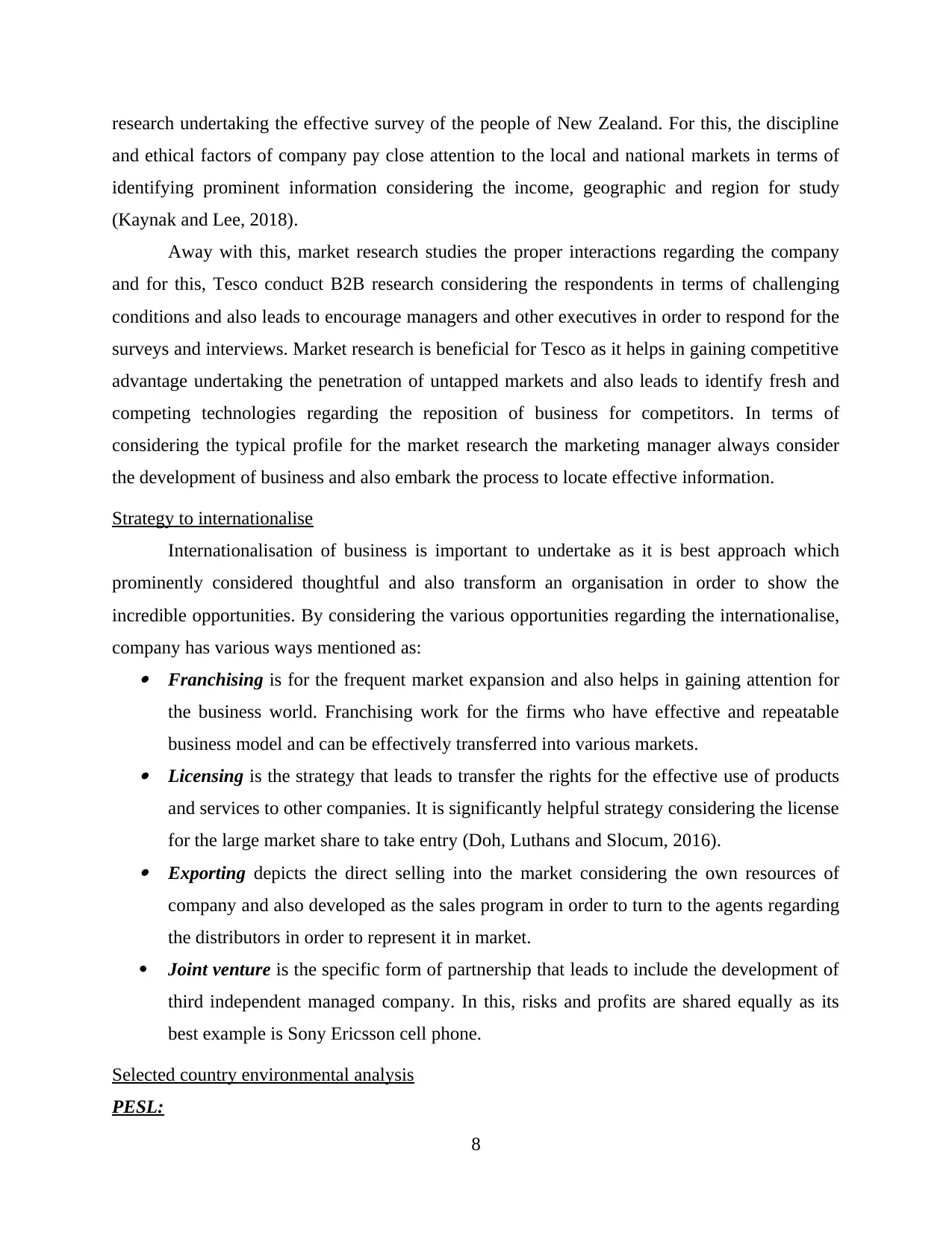
research undertaking the effective survey of the people of New Zealand. For this, the discipline
and ethical factors of company pay close attention to the local and national markets in terms of
identifying prominent information considering the income, geographic and region for study
(Kaynak and Lee, 2018).
Away with this, market research studies the proper interactions regarding the company
and for this, Tesco conduct B2B research considering the respondents in terms of challenging
conditions and also leads to encourage managers and other executives in order to respond for the
surveys and interviews. Market research is beneficial for Tesco as it helps in gaining competitive
advantage undertaking the penetration of untapped markets and also leads to identify fresh and
competing technologies regarding the reposition of business for competitors. In terms of
considering the typical profile for the market research the marketing manager always consider
the development of business and also embark the process to locate effective information.
Strategy to internationalise
Internationalisation of business is important to undertake as it is best approach which
prominently considered thoughtful and also transform an organisation in order to show the
incredible opportunities. By considering the various opportunities regarding the internationalise,
company has various ways mentioned as: Franchising is for the frequent market expansion and also helps in gaining attention for
the business world. Franchising work for the firms who have effective and repeatable
business model and can be effectively transferred into various markets. Licensing is the strategy that leads to transfer the rights for the effective use of products
and services to other companies. It is significantly helpful strategy considering the license
for the large market share to take entry (Doh, Luthans and Slocum, 2016). Exporting depicts the direct selling into the market considering the own resources of
company and also developed as the sales program in order to turn to the agents regarding
the distributors in order to represent it in market.
Joint venture is the specific form of partnership that leads to include the development of
third independent managed company. In this, risks and profits are shared equally as its
best example is Sony Ericsson cell phone.
Selected country environmental analysis
PESL:
8
and ethical factors of company pay close attention to the local and national markets in terms of
identifying prominent information considering the income, geographic and region for study
(Kaynak and Lee, 2018).
Away with this, market research studies the proper interactions regarding the company
and for this, Tesco conduct B2B research considering the respondents in terms of challenging
conditions and also leads to encourage managers and other executives in order to respond for the
surveys and interviews. Market research is beneficial for Tesco as it helps in gaining competitive
advantage undertaking the penetration of untapped markets and also leads to identify fresh and
competing technologies regarding the reposition of business for competitors. In terms of
considering the typical profile for the market research the marketing manager always consider
the development of business and also embark the process to locate effective information.
Strategy to internationalise
Internationalisation of business is important to undertake as it is best approach which
prominently considered thoughtful and also transform an organisation in order to show the
incredible opportunities. By considering the various opportunities regarding the internationalise,
company has various ways mentioned as: Franchising is for the frequent market expansion and also helps in gaining attention for
the business world. Franchising work for the firms who have effective and repeatable
business model and can be effectively transferred into various markets. Licensing is the strategy that leads to transfer the rights for the effective use of products
and services to other companies. It is significantly helpful strategy considering the license
for the large market share to take entry (Doh, Luthans and Slocum, 2016). Exporting depicts the direct selling into the market considering the own resources of
company and also developed as the sales program in order to turn to the agents regarding
the distributors in order to represent it in market.
Joint venture is the specific form of partnership that leads to include the development of
third independent managed company. In this, risks and profits are shared equally as its
best example is Sony Ericsson cell phone.
Selected country environmental analysis
PESL:
8
Paraphrase This Document
Need a fresh take? Get an instant paraphrase of this document with our AI Paraphraser
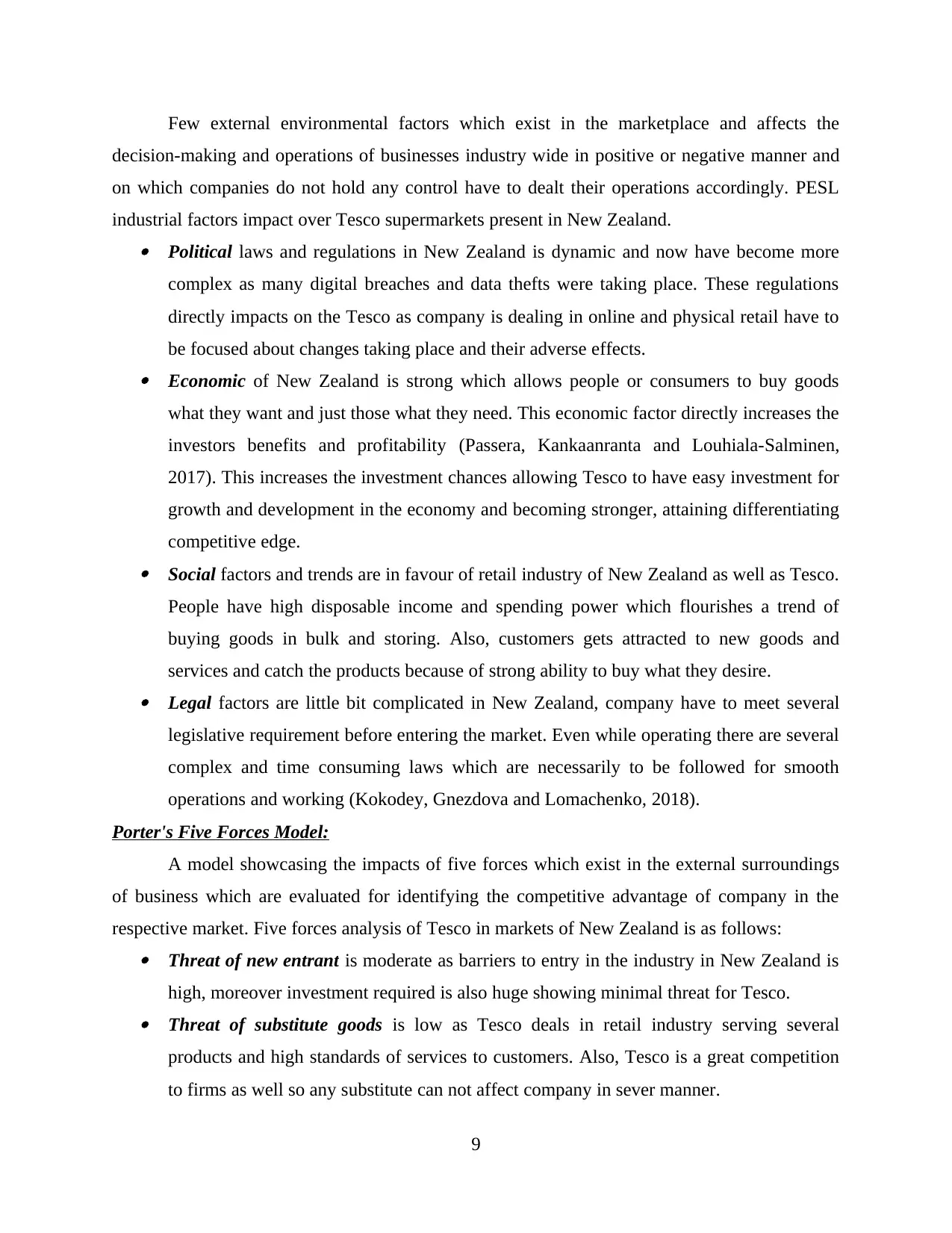
Few external environmental factors which exist in the marketplace and affects the
decision-making and operations of businesses industry wide in positive or negative manner and
on which companies do not hold any control have to dealt their operations accordingly. PESL
industrial factors impact over Tesco supermarkets present in New Zealand. Political laws and regulations in New Zealand is dynamic and now have become more
complex as many digital breaches and data thefts were taking place. These regulations
directly impacts on the Tesco as company is dealing in online and physical retail have to
be focused about changes taking place and their adverse effects. Economic of New Zealand is strong which allows people or consumers to buy goods
what they want and just those what they need. This economic factor directly increases the
investors benefits and profitability (Passera, Kankaanranta and Louhiala-Salminen,
2017). This increases the investment chances allowing Tesco to have easy investment for
growth and development in the economy and becoming stronger, attaining differentiating
competitive edge. Social factors and trends are in favour of retail industry of New Zealand as well as Tesco.
People have high disposable income and spending power which flourishes a trend of
buying goods in bulk and storing. Also, customers gets attracted to new goods and
services and catch the products because of strong ability to buy what they desire. Legal factors are little bit complicated in New Zealand, company have to meet several
legislative requirement before entering the market. Even while operating there are several
complex and time consuming laws which are necessarily to be followed for smooth
operations and working (Kokodey, Gnezdova and Lomachenko, 2018).
Porter's Five Forces Model:
A model showcasing the impacts of five forces which exist in the external surroundings
of business which are evaluated for identifying the competitive advantage of company in the
respective market. Five forces analysis of Tesco in markets of New Zealand is as follows: Threat of new entrant is moderate as barriers to entry in the industry in New Zealand is
high, moreover investment required is also huge showing minimal threat for Tesco. Threat of substitute goods is low as Tesco deals in retail industry serving several
products and high standards of services to customers. Also, Tesco is a great competition
to firms as well so any substitute can not affect company in sever manner.
9
decision-making and operations of businesses industry wide in positive or negative manner and
on which companies do not hold any control have to dealt their operations accordingly. PESL
industrial factors impact over Tesco supermarkets present in New Zealand. Political laws and regulations in New Zealand is dynamic and now have become more
complex as many digital breaches and data thefts were taking place. These regulations
directly impacts on the Tesco as company is dealing in online and physical retail have to
be focused about changes taking place and their adverse effects. Economic of New Zealand is strong which allows people or consumers to buy goods
what they want and just those what they need. This economic factor directly increases the
investors benefits and profitability (Passera, Kankaanranta and Louhiala-Salminen,
2017). This increases the investment chances allowing Tesco to have easy investment for
growth and development in the economy and becoming stronger, attaining differentiating
competitive edge. Social factors and trends are in favour of retail industry of New Zealand as well as Tesco.
People have high disposable income and spending power which flourishes a trend of
buying goods in bulk and storing. Also, customers gets attracted to new goods and
services and catch the products because of strong ability to buy what they desire. Legal factors are little bit complicated in New Zealand, company have to meet several
legislative requirement before entering the market. Even while operating there are several
complex and time consuming laws which are necessarily to be followed for smooth
operations and working (Kokodey, Gnezdova and Lomachenko, 2018).
Porter's Five Forces Model:
A model showcasing the impacts of five forces which exist in the external surroundings
of business which are evaluated for identifying the competitive advantage of company in the
respective market. Five forces analysis of Tesco in markets of New Zealand is as follows: Threat of new entrant is moderate as barriers to entry in the industry in New Zealand is
high, moreover investment required is also huge showing minimal threat for Tesco. Threat of substitute goods is low as Tesco deals in retail industry serving several
products and high standards of services to customers. Also, Tesco is a great competition
to firms as well so any substitute can not affect company in sever manner.
9
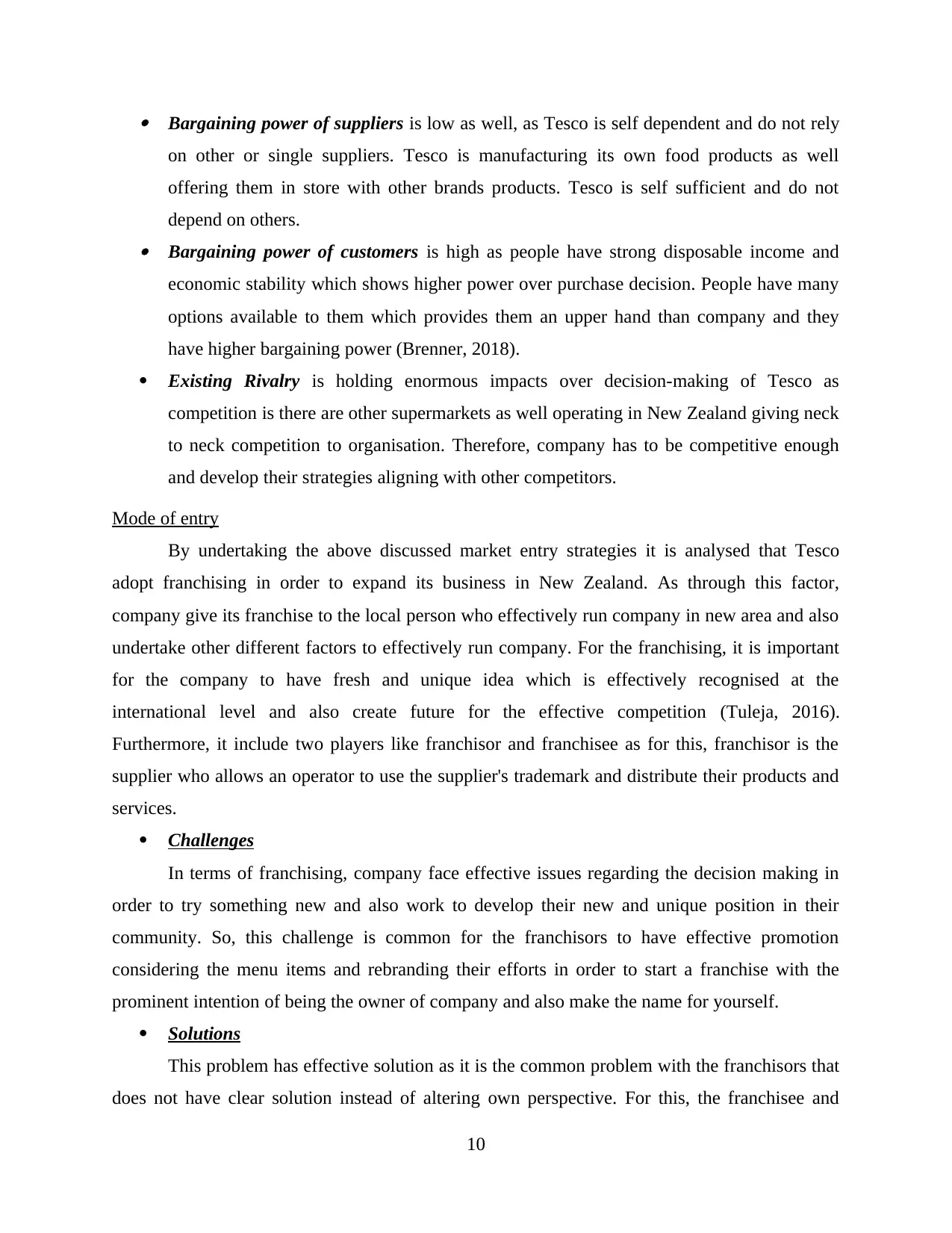
Bargaining power of suppliers is low as well, as Tesco is self dependent and do not rely
on other or single suppliers. Tesco is manufacturing its own food products as well
offering them in store with other brands products. Tesco is self sufficient and do not
depend on others. Bargaining power of customers is high as people have strong disposable income and
economic stability which shows higher power over purchase decision. People have many
options available to them which provides them an upper hand than company and they
have higher bargaining power (Brenner, 2018).
Existing Rivalry is holding enormous impacts over decision-making of Tesco as
competition is there are other supermarkets as well operating in New Zealand giving neck
to neck competition to organisation. Therefore, company has to be competitive enough
and develop their strategies aligning with other competitors.
Mode of entry
By undertaking the above discussed market entry strategies it is analysed that Tesco
adopt franchising in order to expand its business in New Zealand. As through this factor,
company give its franchise to the local person who effectively run company in new area and also
undertake other different factors to effectively run company. For the franchising, it is important
for the company to have fresh and unique idea which is effectively recognised at the
international level and also create future for the effective competition (Tuleja, 2016).
Furthermore, it include two players like franchisor and franchisee as for this, franchisor is the
supplier who allows an operator to use the supplier's trademark and distribute their products and
services.
Challenges
In terms of franchising, company face effective issues regarding the decision making in
order to try something new and also work to develop their new and unique position in their
community. So, this challenge is common for the franchisors to have effective promotion
considering the menu items and rebranding their efforts in order to start a franchise with the
prominent intention of being the owner of company and also make the name for yourself.
Solutions
This problem has effective solution as it is the common problem with the franchisors that
does not have clear solution instead of altering own perspective. For this, the franchisee and
10
on other or single suppliers. Tesco is manufacturing its own food products as well
offering them in store with other brands products. Tesco is self sufficient and do not
depend on others. Bargaining power of customers is high as people have strong disposable income and
economic stability which shows higher power over purchase decision. People have many
options available to them which provides them an upper hand than company and they
have higher bargaining power (Brenner, 2018).
Existing Rivalry is holding enormous impacts over decision-making of Tesco as
competition is there are other supermarkets as well operating in New Zealand giving neck
to neck competition to organisation. Therefore, company has to be competitive enough
and develop their strategies aligning with other competitors.
Mode of entry
By undertaking the above discussed market entry strategies it is analysed that Tesco
adopt franchising in order to expand its business in New Zealand. As through this factor,
company give its franchise to the local person who effectively run company in new area and also
undertake other different factors to effectively run company. For the franchising, it is important
for the company to have fresh and unique idea which is effectively recognised at the
international level and also create future for the effective competition (Tuleja, 2016).
Furthermore, it include two players like franchisor and franchisee as for this, franchisor is the
supplier who allows an operator to use the supplier's trademark and distribute their products and
services.
Challenges
In terms of franchising, company face effective issues regarding the decision making in
order to try something new and also work to develop their new and unique position in their
community. So, this challenge is common for the franchisors to have effective promotion
considering the menu items and rebranding their efforts in order to start a franchise with the
prominent intention of being the owner of company and also make the name for yourself.
Solutions
This problem has effective solution as it is the common problem with the franchisors that
does not have clear solution instead of altering own perspective. For this, the franchisee and
10
⊘ This is a preview!⊘
Do you want full access?
Subscribe today to unlock all pages.

Trusted by 1+ million students worldwide
1 out of 17
Related Documents
Your All-in-One AI-Powered Toolkit for Academic Success.
+13062052269
info@desklib.com
Available 24*7 on WhatsApp / Email
![[object Object]](/_next/static/media/star-bottom.7253800d.svg)
Unlock your academic potential
Copyright © 2020–2026 A2Z Services. All Rights Reserved. Developed and managed by ZUCOL.





